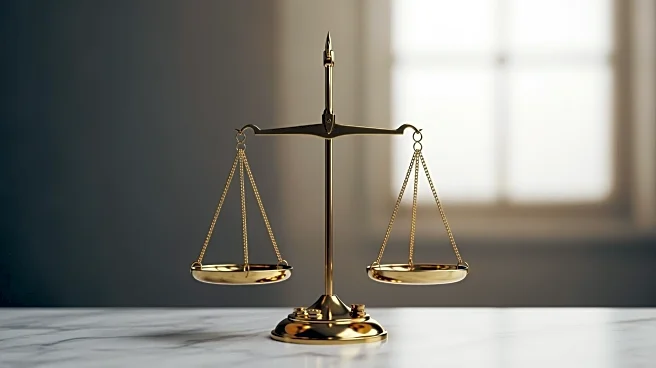What's Happening?
President Trump has issued a pardon for Changpeng Zhao, the founder of Binance, the world's largest cryptocurrency exchange. Zhao, commonly referred to as CZ, was previously convicted for violating anti-money-laundering
laws and U.S. sanctions, resulting in a $4.3 billion penalty and a four-month prison sentence. The Trump administration has taken a more favorable stance towards cryptocurrency, contrasting with previous administrations. The White House criticized past actions against Zhao as part of a 'war on cryptocurrency.' This pardon may allow Binance to re-enter the U.S. market, which it had exited due to conditions set by the Department of Justice settlement. The pardon effectively clears Zhao's record, potentially restoring his reputation within the crypto industry.
Why It's Important?
The pardon of Changpeng Zhao by President Trump marks a significant shift in U.S. policy towards cryptocurrency regulation. This decision could have wide-reaching implications for the cryptocurrency industry, potentially encouraging more favorable regulatory conditions. Binance's potential re-entry into the U.S. market could increase competition and innovation within the sector. The move may also signal to other cryptocurrency companies that the U.S. is open to revisiting its regulatory approach, which could lead to increased investment and growth in the industry. Stakeholders in the cryptocurrency market, including investors and companies, may view this as a positive development, potentially leading to increased market activity and confidence.
What's Next?
With the pardon, Binance may seek to re-establish its presence in the U.S. market, which could involve navigating regulatory requirements and rebuilding relationships with U.S. financial institutions. The cryptocurrency industry will likely monitor the administration's next steps closely, as this pardon could set a precedent for future regulatory actions. Other cryptocurrency companies may be encouraged to lobby for similar favorable treatment, potentially leading to a broader shift in U.S. cryptocurrency policy. Additionally, there may be reactions from political leaders and regulatory bodies, who could either support or challenge this new approach to cryptocurrency regulation.
Beyond the Headlines
The pardon raises questions about the ethical and legal dimensions of presidential pardons, particularly in cases involving significant financial penalties and regulatory violations. It may prompt discussions about the balance between fostering innovation in emerging industries and maintaining strict regulatory standards to prevent financial misconduct. The decision could also influence global perceptions of U.S. regulatory practices, potentially affecting international relations in the cryptocurrency sector. Long-term, this development might contribute to a shift in how governments worldwide approach cryptocurrency regulation, balancing innovation with oversight.










